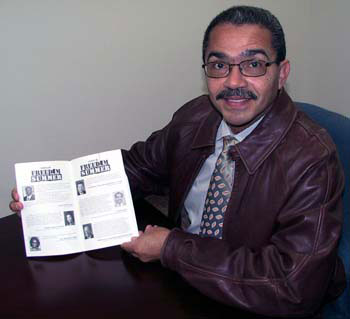Return to 'Freedom Summer'
 |
| Anthony Harris And Program From Drama
'Freedom Summer' |
Anthony Harris and the Civil Rights Movement grew up together.
Harris was just a baby 50 years ago, May 17, 1954, when the
U. S. Supreme Court ruled that separate but equal was not
an appropriate response to the race issues threatening to
rip apart the United States.
Ten years later as a pre-teen, about the time of the Civil
Rights Act of 1964, he was participating in marches, demonstrations,
sit-ins, boycotts, and voter registration drives. That year
is now known for its Freedom Summer.
Despite these efforts, many in Harris's hometown of Hattiesburg,
Miss., were still not allowed to vote. Schools remained separate
and unequal.
On a cold and rainy January day in 1965, Harris and two of
his friends were arrested for picketing the Forrest County
Courthouse in Hattiesburg.
They were thrown into a police car. Officers threatened first
to feed them to their police dogs, then to beat them with
a blackjack club.
They were released when Harris's mother burst into the interrogation
room, defied the officers and demanded they free the boys.
In the fall of 1966 Harris was one of five teenagers who chose
to integrate Hattiesburg's W. I. Thames Junior High School.
This was four years after James Meredith had enrolled at the
University of Mississippi, setting off a riot that led to
the death of a French journalist.
Anthony Harris survived those times and maintained his interest
in education, earned his doctorate, and now teaches at Sam
Houston State University. On Tuesday he returns to Hattiesburg
High School to introduce a student play that includes the
incident of his arrest 39 years ago.
On Thursday night James Meredith will introduce that play--"Freedom
Summer."
"My own recollection of Freedom Summer contains memories
of being taught by folk singer Pete Seeger to play the guitar
at the Mt. Zion Baptist Church Freedom School," Harris
wrote in the play's program.
"Walking the dusty roads of black Hattiesburg in the
sweltering heat helping with voter registration drives, and
being mesmerized by the performance of Purlie Victorious and
In White America at St. Paul United Methodist Church by a
group of thespians known as, The Free Southern Theater, founded
by Gilbert Moses.
"My most enduring memory, however, is of my mother, who
modeled and instilled in her children the courage to stand
for what is right and to resist evil in all of its manifestations,
no matter where we find it."
Other memories include being spat upon, being repeatedly called
that most awful "N" word, and enduring biased teachers
who could not see beyond his color when it came time to assigning
him grades.
The worst may have been hearing his white classmates cheer
the death of the person who instilled in him his appreciation
of non-violence.
He remembers he had "never felt as tormented, as alone,
as friendless," as when classmates cheered and joked
about the April 5, 1968 shooting death of Martin Luther King.
"Regrettably," he says now, "I find it increasingly
difficult to persuade young people to accept the principle
of non-violence."
Then he quotes King.
"'If, as a nation, we continue to follow the retaliatory
notion of an eye for an eye; tooth for a tooth, we will end
up being a blind, toothless society.'"
Not only has Harris practiced non-violence, he has worked
within education to better society. He started a program for
at-risk black students called Project Keep Hope Alive in Commerce,
Texas, where he taught before coming to SHSU last year.
Also while in Commerce, he was active in public schools as
well. This might seem natural for a professor of education,
but he has gone beyond a casual interest, serving as a school
board member for 15 years, including six as a board chair.
"Through the altruistic efforts of transforming the lives
of many young African American boys through Project Keep Hope
Alive and the experience of being a young participant in the
civil rights movement decades earlier, my own life has been
unalterably transformed," said Harris.
"And in the process, I have become more deeply committed
to the notion of social justice, not as an abstract concept
but as a living, breathing attainable goal, to which all communities
and peoples are entitled."
- END -
SHSU Media Contact: Frank Krystyniak
February 2, 2004
Please send comments, corrections, news tips to Today@Sam.edu
|


